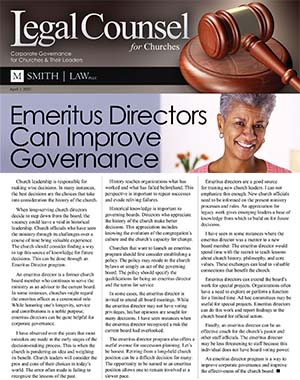Church directors have a fiduciary duty to make decisions that are in the best interests of the church. These duties include a duty of care, duty of loyalty and duty of obedience. These responsibilities are the same for any board of directors. No matter the organization, industry or charter, directors must keep a primary focus on the institution’s interests.
Board members must act prudently to fulfill their obligations. Courts weigh a director’s conduct by comparing his/her actions to someone in similar roles. This is called the “reasonable person” standard. In other words, how would a director of any corporation treat a subject.
So long as church directors follow the guiding principle of these duties, their conduct will usually not be called into question. Occasionally, directors make mistakes and come under legal scrutiny. There is a lesson to be learned in reviewing the ways directors can get in trouble. Here is a list of areas that can trap directors.
Reviewing Financial Statements: Church directors should have financial literacy on church matters. This includes understanding the church financial condition, sources of income, expenses, and fiscal obligations. Reviewing financial statements also include the directors’ review of any financial audits.
Travel and Expense Policies: Directors should pay particular attention to travel and expense policies. These areas can be troublesome because of the opportunity for waste or misappropriation of church funds. It is reasonable for directors to be watchful that the church policies are carefully followed.
Whistleblower Policies: Whistleblower policies are useful for helping an organization encourage disclosure of questionable activities. A church’s whistleblower policy should grant protections for the whistleblower from retaliation. Directors have an obligation to ensure the policies are managed in a way no whistleblowers’ rights are usurped.
Overseeing Investments: Church investments offer the institution an opportunity to puts its treasury to work for the benefit of the congregation. Investments can be tricky because some instruments carry more risk that other investments.
For this reason, church directors should be particularly wary of approving investments they do not understand. Church officers can find themselves in jeopardy by failing to ask questions to get to the bottom-line matter of any investment decision.
Compensation and Performance: The church board is usually responsible for hiring and monitoring the pastor as the chief executive officer. The church directors should understand the pastor’s compensation package. This includes incentives, bonuses, perks and fringe benefits. Periodic performance reviews help demonstrate to a court that the board actively monitors the pastor’s performance.
Micromanaging Staff: A board’s chief role is to set policies, develop strategies and make fundamental decisions for the church. When a board micromanages the church’s staff, the directors often lose focus on the big picture of guiding the church. This creates a duty of care risk for the board. The reasonable person standard suggests other directors in a like position may not be so focused on micro matters.
Legal Compliance: All organizations must comply with relevant laws. This includes churches. Some laws regulate employment, tax, traffic, and operational matters. A prudent church board understand the rules that apply to their institution and ensures a compliance program is in place to avoid violating the laws.
Confidentiality: All directors have an obligation to treat sensitive discussions with confidentiality. As board members, directors gain insight into delicate information about the church. Some matters concern privileged information about church families. Other materials involve corporate transactions and church business. Directors owe the church a duty to protect confidential information.
Independence: Church directors owe the church the duty to remain independent. This means directors should make decisions that are not unduly influenced by others, including other directors. Church officials’ decisions should be made with the directors’ judgment for what is best for the church.
Conflicts of Interest: A conflict of interest will get a director in hot water as quick as any action. When a director is perceived to have an ulterior motive or interest in a transaction that works against the best interest of the church, the director should disclose the conflict. Failure to self-disclose conflicts can lead to personal liability
The Consequences: Church directors who violate their fiduciary duties may find themselves facing personal liability. This means a director’s personal assets could be the subject of civil penalties and fines. Most protections directors enjoy against personal liabilities, such as insurance, indemnifications, and waivers, often evaporate when fiduciary duties are violated.
A church board should be diligent about its practices and conduct. This discipline will help improve the ministry. Moreover, adherence to good governance will protect everyone from negative publicity, financial damages and inefficiencies.

